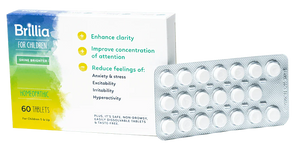Truths for Moms when Their Children have Anxiety
All parents want their kids to be happy, but if your child or teen has anxiety, you know what a challenge this could be and how isolated you can feel at times. The people around you won’t always understand how hard you’re working, and how hard your child is working to feel calm and connected to those around them.
The truth is, there are thousands of parents who are going through exactly what you are. They’re searching for balance, assistance, and a little bit of a break. In fact, what you’ve been experiencing is more normal than you may think. These are 10 truths that parents like you feel every day, too.
1. The General Public Doesn’t Always Understand Anxiety
Isolation is a terrible feeling. One minute you’re walking through the grocery store just like everyone else, and the next minute your child or teen is feeling overwhelmed or having an anxiety attack. You start to feel like all the other shoppers are staring at you, judging your child and your ability to parent. In those moments you’re wishing for just one person to understand the unpredictable nature of anxiety and offer your child (and you) a little compassion.
2. School Administration Can Feel Like the Enemy
It’s not the school’s fault—at least not all the time. A single school administration is responsible for the well-being and education of hundreds of students at a time. They don’t always have the resources to dedicate to the specific needs of your child. But sometimes it can feel like they’re just trying to fight you every step of the way. It can feel frustrating—even impossible at times—but ultimately, building a good relationship with the administration is worth the effort for the success of your child. Keep in mind that children and teens diagnosed with anxiety disorders may be eligible for classroom accommodations under the Individuals with Disabilities Education Act or Section 504 of the Vocational Rehabilitation Act of 1973.1 This might look like preferential seating, extra time on tasks, frequent check-ins, or modified homework or tests.
3. Friendships are Difficult – Especially for Teens
Anxiety often shows up during stressful situations. Unfortunately, building new friends can be one of the most stressful situations for a young person, especially if they struggle with social anxiety. Sometimes, the quick change in their behavior or general avoidance could make it difficult for new friendships to form. And of course, the longer it takes for your child or teen to build strong friendships, the more anxious they feel about them. But great friendships are what keep us all going, and it’s no different for your child. As you teach them to embrace their unique selves, find people who “get” them, and manage their anxiety more effectively,their friendships will grow.
4. Travel is Overwhelming
Kids and teens with anxiety thrive on routine. Knowing exactly when they’re going to eat, sleep, and play helps them predict their day and manage their anxiety. While traveling can be an enriching experience, it can also be overwhelming. You’ll find yourself constantly weighing the pros and cons of taking trips: the great experiences you’ll have and the difficulty of navigating all the stress. By preparing beforehand (maybe even over preparing) and making sure to prioritize healthy behaviors like good sleep and proper nutrition, your travel experiences can be rewarding for all members of the family. Check out these five great vacation ideas to help you get started.
5. Prioritizing Your Other Kids is Challenging
Spending equal quality time with each of your children might be your goal, but the heartbreaking reality of managing anxiety is that it can be time-consuming. This means your focus often turns solely on the child experiencing an anxiety attack. This can lead to your other children feeling excluded or ignored. But a balance isn’t impossible to achieve. Be honest with your kids. You can make the small moments stand out as togetherness, just by saying, “I love you, and I’m glad to be with you right now.”
6. You Forget to Maintain Your Own Balance
When so much of your focus is on your children and their health, it’s easy to forget what you need. Months go by before you check in with yourself and your own mental clarity. A simple way to stay connected with your own needs is to engage in mindfulness practices as a family. Do meditations with them, take nature walks, or enjoy relaxing screen-free time to keep yourself (and them) balanced.
7. Your Options for Treatments Can Feel Limited
If every person is unique, it stands to reason that every treatment plan would be unique. In most countries, however, we find that one plan is prescribed to everyone despite their individual circumstance. When that treatment doesn’t work for your child, you may start to feel hopeless. In these moments, remember that there is always another option. Alternatives do exist, whether that’s talking to a therapist or trying a non-prescription medication; you just have to keep looking.
8. Helping Your Child or Teen Gets Expensive
Treatment is expensive. There’s no way around it. Traveling to different doctors, paying for therapy and specialty foods adds up quickly. You find yourself taking yet more time off work to pick your child up from school. And nothing feels more pressing than the shadow of limited finances. If you feel yourself buckling under the stress of money troubles, take a deep breath. You aren’t alone. What you’re working toward is worth the sacrifice.
9. Anxiety Symptoms Are Unpredictable
The erratic nature of anxiety means that you can never plan for it. You just have to live your normal life and hope for the best. But naturally, you’re always worried about when the next wave of anxiety will hit. That acute, persistent stress will take a toll on anyone. Some days it just feels like one more thing you really don’t need to deal with. Identifying triggers that cause anxiety in your child or teen can help you best prepare for situations beforehand. And practicing relaxation techniques consistently can provide them access to a familiar tool they can call on when they start to feel anxious, whether that’s mindful breathing, journaling, or a short meditation.
10. Making Friends is Stressful, Yet Important
Encouraging teens to make friends and come out of their shell can have a massive impact on how frequently and intensely their anxiety shows up. Studies show that people who enjoy close friendships as teens have a lower rate of depression or anxiety later in life.2 Other benefits of friendship include: less loneliness, emotional support, reduced stress, and a sense of belonging and purpose. There are also physical benefits to making friendships, which are rooted in changing how the brain and body respond to stress. This translates to a lower risk of heart attack, stroke, and premature death.3 But sometimes your child just needs a little extra support to make friends. Some things you can try:
- Help them work on their conversation skills by practicing good listening and conversation starters
- Encourage them to join groups or clubs devoted to activities they enjoy
- Limit their time on screens, especially social media, which can hurt their self-esteem, take up too much of their time, and exacerbate anxiety symptoms
- Make sure their time is not overloaded with too many extracurricular activities and homework, which can leave little time to socialize
…Yet You Wouldn’t Trade it for Anything
At the end of the day, these stresses all pale in comparison to the many joys of seeing your child grow and become their own person. Some days are more taxing than others, but you wouldn’t trade any of it because it’s what makes your child who they are.
At Brillia, we know that dealing with anxiety can be difficult, but we also know that with the right support, your child can and will thrive. Our 5 Pillar holistic approach offers a foundation you can turn to when figuring out strategies on how to best support your child, and it all starts with refining their lifestyle habits. Following a healthy diet, getting adequate sleep, controlling screen time, and practicing mindfulness are all proven ways to help reduce symptoms of anxiety long term and teach your child how to self-regulate.
If your child or teen needs more support for anxiety, consider trying non-prescription Brillia, a homeopathic medication clinically proven to reduce symptoms like anxiety, stress, irritability, and restlessness without harsh, synthetic chemicals or harmful side effects. Brillia contains antibodies to the S100B protein; when elevated, this protein instigates symptoms of anxiety as well as poor focus and hyperactivity. By regulating its activity, Brillia stops these symptoms in their tracks, promoting a sense of calmness and clarity without any off-target side effects. At the same time, this regulating effect stabilizes the levels of other monoamines (dopamine, serotonin, and norepinephrine), so that your child or teen feels more balanced and empowered no matter what obstacles they face.
Learn more about how Brillia works and find more tips and resources on managing stress and anxiety at the Brillia(nce) Resource Center.
Get a whole bunch of support right in your inbox.







